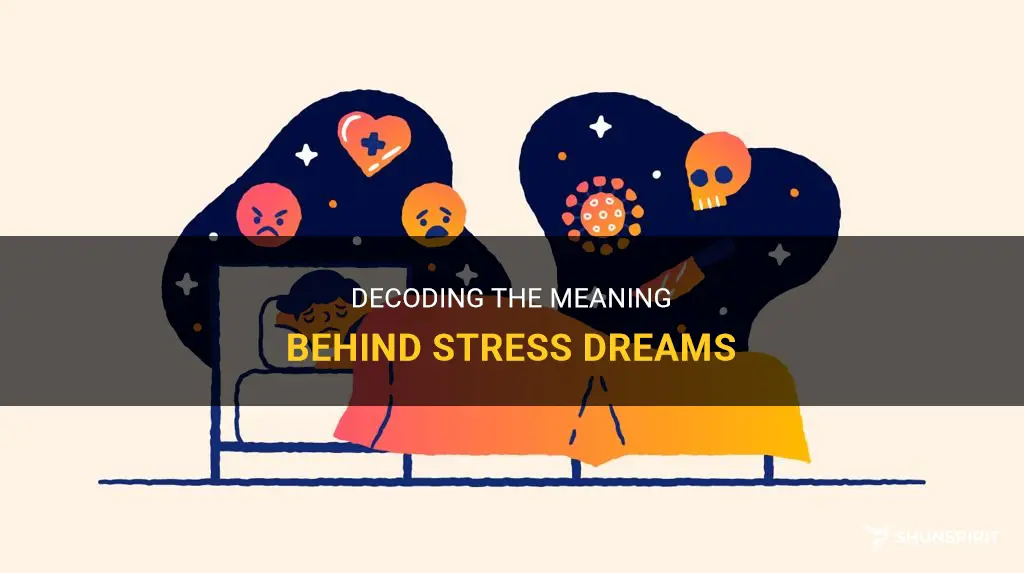
Have you ever woken up feeling stressed, anxious, or even terrified after having a seemingly nonsensical dream? These so-called stress dreams can leave us feeling shaken and confused, but they may actually hold a deeper meaning. Stress dreams can serve as a window into our subconscious mind, offering insight into our deepest fears, worries, and unresolved issues. In this article, we will explore what stress dreams mean and how they can provide valuable information about our mental and emotional well-being. So, next time you wake up from a stress dream, don't dismiss it as just another strange experience – it could be trying to tell you something significant.
What You'll Learn
- What are stress dreams and why do we have them?
- How do stress dreams differ from regular dreams?
- Can stress dreams provide insight into underlying stressors in our lives?
- Do stress dreams serve any purpose or are they purely negative experiences?
- Are there any effective strategies for reducing or eliminating stress dreams?

What are stress dreams and why do we have them?
Many people experience stress dreams, also known as anxiety dreams or nightmares, on a regular basis. These dreams are often characterized by vivid and intense feelings of fear, stress, or anxiety, and can leave a lasting impact on the individual's state of mind upon awakening. While the content and themes of stress dreams may vary, they are generally triggered by underlying stress and anxiety in one's waking life.
Stress dreams can take many different forms, ranging from being chased or attacked by an unknown assailant to failing an important exam or presentation. The scenarios depicted in these dreams often reflect the individual's fears and insecurities, as well as the specific stressors they are facing in their daily life. For example, someone who is worried about losing their job may have a stress dream about being fired or being unable to find employment.
The main reason why we have stress dreams is that our dreams often serve as a way for our subconscious mind to process and make sense of the emotions and experiences we encounter during our waking hours. When we are stressed or anxious, our body releases stress hormones, such as cortisol, which can influence the content and intensity of our dreams.
During the dreaming phase of sleep, known as REM (rapid eye movement) sleep, our brain is highly active, and our dreams can be influenced by the emotional and psychological stresses we face in our daily lives. The images and scenarios that play out in our dreams may be symbolic representations of the stressors we are currently dealing with, allowing our minds to process and cope with these emotions in a safe environment.
It is important to note that stress dreams are a normal response to stress and anxiety and are not necessarily a cause for concern. However, if these dreams become frequent and start to negatively impact one's quality of sleep or overall well-being, it may be beneficial to seek professional help, such as speaking with a therapist or counselor, who can provide guidance and coping strategies.
There are several techniques that can be helpful in managing stress and reducing the occurrence of stress dreams. Engaging in regular exercise, practicing relaxation techniques such as deep breathing or meditation, and maintaining a consistent sleep routine are all known to promote better sleep quality and reduce stress levels. Additionally, identifying and addressing the underlying causes of stress in one's life can be beneficial in preventing stress dreams from occurring.
In conclusion, stress dreams are a common phenomenon experienced by many individuals and are often triggered by underlying stress and anxiety. These dreams serve as a means for our subconscious mind to process and cope with the emotions and experiences we encounter during our waking life. While stress dreams can be unsettling, they are a normal response to stress and can be managed through various techniques to promote better sleep and overall well-being.
Diving into the Depths: Understanding the Dream Meaning of Swimming
You may want to see also

How do stress dreams differ from regular dreams?
Stress dreams are a common phenomenon experienced by many individuals. These dreams typically occur during periods of high stress or anxiety and can leave the dreamer feeling exhausted and unsettled upon waking up. So, how do stress dreams differ from regular dreams?
- Intensity: The most noticeable difference between stress dreams and regular dreams is the intensity of emotions experienced. Stress dreams often evoke feelings of fear, panic, and unease. These emotions can be so intense that they wake the dreamer up in the middle of the night. Regular dreams, on the other hand, may elicit a range of emotions, but they are typically not as overwhelming or distressing.
- Content: Stress dreams tend to focus on the stressor or the source of anxiety in the dreamer's life. For example, if someone is stressed about an upcoming presentation, their stress dream might involve forgetting their lines or being unprepared on stage. Regular dreams, on the other hand, can involve a variety of random and unrelated scenarios.
- Recurrence: Stress dreams often occur repeatedly during periods of high stress or anxiety. The content of the dream may vary, but the underlying theme is usually related to the stressor. Regular dreams, on the other hand, vary more in content and are less likely to occur repeatedly.
- Physical response: Stress dreams can have a noticeable impact on the dreamer's physical state. Individuals may wake up drenched in sweat, with an increased heart rate, or feeling physically exhausted. Regular dreams, while they may also evoke physical responses, are less likely to cause such intense physical reactions.
- Duration: Stress dreams tend to be shorter in duration compared to regular dreams. This could be due to the intense emotions and the dreamer's instinct to wake up and escape the distressing scenario. Regular dreams, on the other hand, can span a longer period of time and may involve multiple scenes or sequences.
- Symbolism: While both stress dreams and regular dreams can contain symbolic elements, stress dreams are often more straightforward in their symbolism. The content of the dream is often directly related to the source of stress or anxiety, making it easier for the dreamer to interpret the meaning. Regular dreams, in contrast, may present more abstract or unusual symbolism that can be more challenging to decipher.
In conclusion, stress dreams differ from regular dreams in terms of intensity, content, recurrence, physical response, duration, and symbolism. They are typically more intense, focused on the stressor, recurring during periods of high stress, and can evoke strong physical reactions. Understanding the differences between stress dreams and regular dreams can help individuals manage their stress and anxiety more effectively.
The biblical symbolism of a teacher appearing in a dream
You may want to see also

Can stress dreams provide insight into underlying stressors in our lives?
Dreams have long been a subject of fascination for scientists, psychologists, and everyday dreamers alike. Many theories have attempted to explain why we dream and what our dreams mean, but one area of particular interest is stress dreams. These are dreams that are often filled with anxiety, fear, and stress, and can be quite vivid and unsettling. But can these stress dreams actually provide insight into the underlying stressors in our lives? Let's take a closer look.
First and foremost, it is important to understand that dreams are highly individual and subjective. What may be stressful for one person may not be for another. Therefore, it is essential to approach the interpretation of stress dreams with caution and consider them as a potential window into our subconscious rather than absolute truths.
That being said, stress dreams can offer valuable insights into our lives. One theory suggests that our dreams act as a form of emotional regulation, allowing us to process and make sense of the stressful experiences we encounter during our waking hours. In this view, stress dreams are a natural response to the challenges and pressures we face, and can provide a safe space for us to confront and deal with these stressors. By analyzing the content of our stress dreams, we might gain a better understanding of the specific sources of stress in our lives.
For example, if someone consistently dreams about being chased, it may indicate unresolved fear or anxiety regarding a specific situation or person. Perhaps there is a work deadline looming, a difficult conversation that needs to be had, or an upcoming event in which they feel unprepared. These dreams can serve as a reminder to address these stressors and find ways to cope with and alleviate them.
In addition to uncovering specific stressors, stress dreams can also shed light on the underlying emotional states and conflicts within ourselves. Dreams offer a unique opportunity for our subconscious to communicate with us, bypassing the filters and defenses we may have in waking life. By paying attention to the emotions present in our stress dreams, we may gain insight into deeper fears, anxieties, or unresolved emotions that we may not be fully aware of during our conscious waking state.
To make the most of stress dreams as a tool for self-discovery and growth, it is important to keep a dream journal. Recording dreams upon waking increases our ability to recall and analyze them. In the case of stress dreams, taking note of specific details, emotions, and patterns can help identify recurring themes and potential triggers.
When interpreting stress dreams, it is crucial to approach them with an open mind and a willingness to explore the underlying messages they may hold. Engaging in self-reflection and discussing dreams with a therapist, friend, or support group can provide additional perspectives and insights.
In conclusion, while stress dreams cannot be taken as direct indicators of the specific stressors in our lives, they can serve as a valuable tool for self-reflection and understanding. By analyzing the content, emotions, and patterns of these dreams, we may gain insight into underlying stressors and unresolved emotional conflicts. Remember to approach stress dreams with curiosity and an open mind, and they may offer a greater understanding of ourselves and our lives.
The eerie significance behind dreams about possessed dolls revealed
You may want to see also

Do stress dreams serve any purpose or are they purely negative experiences?
Dreams are a fascinating and complex aspect of human experience. They can range from joyful and exhilarating to confusing and terrifying. Among the more unpleasant types of dreams are stress dreams, which are characterized by feelings of anxiety, fear, and distress. But do these dreams serve any purpose, or are they purely negative experiences?
While stress dreams may be disturbing and unpleasant, they actually serve several important functions. One of the primary purposes of stress dreams is to help us process and work through the emotions and stressors we experience in our waking lives. For example, if you are feeling overwhelmed at work or school, you may have stress dreams about being unprepared for an important presentation or failing an exam. These dreams provide an outlet for the subconscious mind to process and release the stress and anxiety associated with these situations.
Stress dreams can also act as a warning sign or signal that something in our lives needs attention. They can serve as a wake-up call, prompting us to reevaluate our circumstances and make necessary changes. For instance, if you consistently have stress dreams about missing deadlines or being unprepared for important events, it may be a sign that you need to better manage your time or prioritize your tasks.
Furthermore, stress dreams can provide valuable insights into our inner fears and anxieties. They can bring to light hidden insecurities or unresolved issues that may be impacting our overall well-being. By examining the content and themes of stress dreams, we can gain a deeper understanding of ourselves and potentially uncover areas for personal growth and development.
It is important to note that not all stress dreams are purely negative experiences. While the emotions associated with these dreams may be unpleasant, they can also offer opportunities for growth, self-reflection, and problem-solving. For example, if you have a stress dream about a conflict with a friend or loved one, it may prompt you to have a proactive conversation to address any underlying issues and improve the relationship.
To manage and potentially reduce stress dreams, it can be helpful to practice stress management techniques in your waking life. Engaging in activities such as yoga, meditation, or journaling can help alleviate stress and promote relaxation, which may have a positive impact on your dream content. Additionally, establishing a regular sleep schedule, creating a calm and comfortable sleep environment, and engaging in pre-sleep relaxation techniques can all contribute to a more restful and peaceful night's sleep.
In conclusion, stress dreams serve important purposes beyond being purely negative experiences. They help us process emotions and stress, act as a warning sign, and provide insights into our fears and anxieties. By paying attention to and reflecting on the content of our stress dreams, we can gain valuable self-awareness and take steps towards personal growth. So, while stress dreams may not always be pleasant, they can ultimately serve a purpose in our overall well-being.
Unveiling the Meaning Behind Naked Dreams
You may want to see also

Are there any effective strategies for reducing or eliminating stress dreams?
Stress dreams, also known as anxiety dreams or nightmares, are a common experience for many people. These dreams often occur during periods of high stress or anxiety and can leave individuals feeling tired and unrested. Fortunately, there are several strategies that have been found to be effective in reducing or even eliminating stress dreams.
- Identify the source of stress: The first step in addressing stress dreams is to identify the underlying source of stress. It may be related to work, relationships, or other personal issues. Taking the time to reflect on what is causing stress can be helpful in finding ways to address and resolve the underlying issue.
- Practice relaxation techniques: Engaging in regular relaxation techniques can help reduce overall stress levels and decrease the likelihood of stress dreams. Techniques such as deep breathing exercises, progressive muscle relaxation, or meditation can be effective in promoting relaxation and reducing anxiety.
- Establish a bedtime routine: Creating a consistent bedtime routine can signal to your body that it is time to relax and prepare for sleep. This can include activities such as taking a warm bath, reading a book, or practicing relaxation techniques. By consistently following a routine, your body will become accustomed to the signals that it is time to wind down, making it easier to fall asleep and stay asleep.
- Create a sleep-friendly environment: Your sleep environment can greatly impact the quality of your sleep. Make sure your bedroom is cool, dark, and quiet. Consider using earplugs or a white noise machine to block out any distracting sounds. Additionally, avoid using electronic devices close to bedtime, as the blue light emitted by these devices can disrupt sleep patterns.
- Engage in regular exercise: Regular physical activity has many benefits for overall mental and physical health, including reducing stress and promoting better sleep. Engaging in exercise during the day can help regulate your sleep-wake cycle and promote deeper, more restful sleep at night. However, it's important to avoid exercising too close to bedtime, as this can have the opposite effect and make it harder to fall asleep.
- Practice stress management techniques: Learning how to effectively manage stress is key in reducing stress dreams. This can include techniques such as journaling, talking to a therapist or counselor, or engaging in activities that you find enjoyable and relaxing. By actively managing stress, you can help alleviate tension and anxiety that may contribute to stress dreams.
- Limit caffeine and alcohol intake: Both caffeine and alcohol can disrupt sleep patterns and increase the likelihood of stress dreams. Therefore, it is important to limit your intake of these substances, especially in the hours leading up to bedtime. Opt for decaffeinated beverages and avoid alcohol close to bedtime to promote better sleep.
- Seek professional help if needed: If stress dreams persist and significantly impact your quality of life, it may be beneficial to seek professional help. A therapist or counselor can assist in exploring the underlying causes of stress and provide guidance on effective coping mechanisms.
In conclusion, stress dreams can be disruptive and leave individuals feeling tired and unrested. However, by implementing strategies such as identifying the source of stress, practicing relaxation techniques, establishing a bedtime routine, creating a sleep-friendly environment, engaging in regular exercise, practicing stress management techniques, limiting caffeine and alcohol intake, and seeking professional help if needed, it is possible to reduce or even eliminate stress dreams and improve overall sleep quality. By taking steps to manage stress and promote relaxation, individuals can enjoy more restful nights and wake up feeling refreshed and rejuvenated.
Dreaming of the Future: Unveiling the Meaning Behind Prophetic Visions
You may want to see also
Frequently asked questions
Stress dreams typically reflect the anxiety or worries we are experiencing in our daily lives. They may be a manifestation of unresolved stress or subconscious fears.
Stress dreams occur as a result of our brain trying to process and make sense of the stressors we are facing. They may also arise from the body's physiological response to stress hormones, which can affect our sleep quality.
Stress dreams are not necessarily a sign of a mental health issue on their own. However, recurring or intensely distressing stress dreams might indicate high levels of stress or anxiety that may warrant attention or support from a mental health professional.
Stress dreams can be interpreted to some extent, as they often contain symbols or themes that reflect our inner thoughts and emotions. However, it is important to remember that dream interpretation is subjective and can vary from person to person. It is best to explore the meaning of stress dreams with a qualified professional or by reflecting on your own emotions and experiences.
Reducing stress dreams involves managing your stress levels and improving sleep hygiene. Prioritize self-care, practice relaxation techniques before bed, establish a consistent sleep routine, and address any underlying stressors. Additionally, speaking to a therapist or counselor can provide support in managing stress and anxiety effectively.








3 Comments
Phoebe Morris
Kryms Kaya
AuthorNancy Reynolds